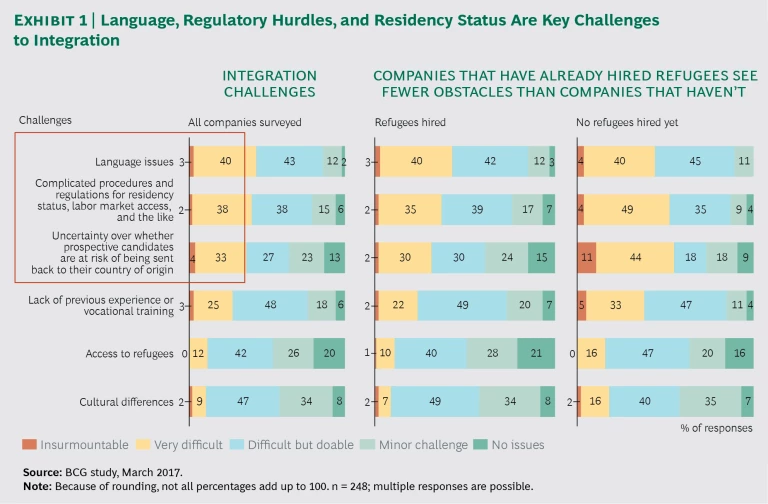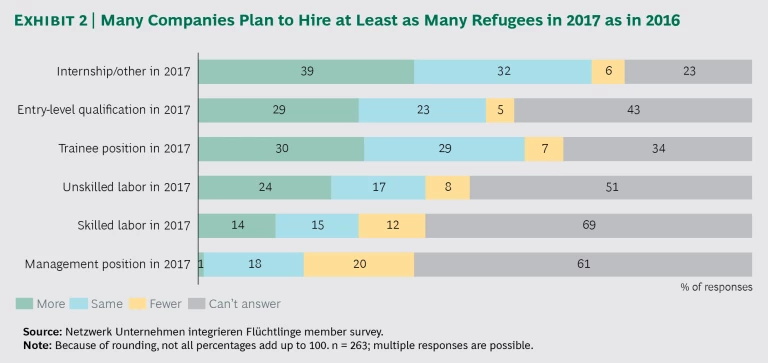Immigration has become a global crisis—and a political hot potato. Worldwide, the number of people seeking asylum grew by more than 40% in the past ten years, surging to 1.3 million in Europe alone in 2015. In robust economic times, communities tend to be more welcoming. But when unemployment is high and job markets are tight, as is the case today, countries that agree to take in asylum seekers often face vocal opposition. In recent years, Germany has largely bucked this trend, granting asylum to more than 500,000 refugees since 2015. Nevertheless, integrating so many recent arrivals into society has been an ongoing challenge. In part because of a shortage of skilled workers, 300 German companies recently offered jobs to 2,500 refugees, in an effort to rapidly integrate them into the labor market. The results of this outreach were largely positive. What can other countries learn from Germany’s experience?
The Boston Consulting Group surveyed the 300 participating companies about their outreach efforts, supplementing those findings with 13 interviews and company visits, and with input from Joblinge, a BCG initiative focused on employment training and placement of young adults—mostly immigrants and
Integration Is Feasible
The survey revealed that refugees can be successfully integrated into any industry, regardless of company size. In fact, 60 small companies, each with fewer than 50 employees, collectively took in almost 200 refugees.
Some jobs were better suited than others to refugees. Of the 2,500 positions reported by participating companies, 1,560 were internships, 330 were entry-level jobs, and 270 were spots in training programs. These conditional work opportunities give refugees a chance to learn new skills, gain experience, and prove themselves—providing a springboard into the German labor market. Permanent positions were far rarer, however, accounting for only 13% of the total number of positions that participating companies offered to refugees.
The Challenges Are Manageable
Survey results indicated that refugees present some challenges that other candidates for employment may not—but also that the challenges aren’t insurmountable. Cultural differences and a lack of precisely relevant experience, for instance, proved to be of little consequence. The language barrier is a bigger issue: about 40% of responding companies cited it as “insurmountable” or “very difficult.” When they lack a basic level of language proficiency, refugees need more time to absorb the content, directions, and training required to succeed in their jobs. Regulatory hurdles pose another problem. On the business side, issues such as “complicated procedures and regulations for residency status, labor market access, and the like” and “uncertainty over whether prospective candidates are at risk of being sent back to their country of origin” make integration more difficult. (See Exhibit 1.)
Actually working with refugees can allay concerns over some of the perceived issues, however. Except with regard to the language barrier, about which both groups of companies tend to hold very similar views, companies that have already hired refugees tend to see significantly fewer obstacles and express fewer reservations about hiring them than companies that haven’t.
The Investment Pays Off
Companies that hired refugees incurred upfront costs in four areas.
First, since résumés may lack documentation and refugees’ work experience may be unverified, companies often hire them through personal networks rather than through job postings, employment agencies, or job centers. In time spent by a company’s employees, the process of finding and qualifying a suitable candidate costs about €750 per refugee (based on an estimated staff rate of €50 per hour).
Second, since refugees rarely possess the needed language skills—even after completing a standard integration course—most will require further language training with a focus on job-specific vocabulary. Such training can cost as much as €1,500 per person during the first year alone.
Third, many candidates need further support and tutoring to complete their vocational training. For instance, trainers may need to visually demonstrate a task in addition to explaining it verbally, and certain subjects may require remedial tutoring. This extra support typically costs about €1,800 per person (again based on an estimated staff rate of €50 per hour).
Finally, refugees often need support from a company’s employees in their everyday activities, such as visiting authorities, obtaining translations, or finding suitable accommodations. The cost in time spent on these support activities amounts to about €3,500 per person, on average, in the first year (again reflecting the €50 staff rate).
Together, these integration costs total about €7,500 per employee in year one, on top of the regular training costs of about €18,000, which amounts to roughly a 40% premium for
Offsetting these investments, however, are the added earnings that the refugees generate—especially in understaffed jobs and industries. State funding (such as the integration subsidy paid by Germany’s Federal Employment Agency) further offsets these investments. Thanks to the subsidies and added earnings, the payback period for the initial investment is typically only a year.
The example of Kremer Machine Systems, a specialist in industrial assembly, shows the value of the refugee program to industries in which a shortage of skilled labor is an obstacle to growth. An investment by the company of €6,200 per refugee—and a focus on language and skills training—pays off in most instances within six months, and sometimes sooner.
Most Participating Companies Plan to Hire Refugees Again
The companies that we surveyed plan to contribute further to Germany’s integration efforts. Looking forward to 2017, more than 70% of respondents said that they expect to offer at least the same number of internships, more than 50% intend to award at least the same number of entry-level jobs, and 60% plan to fill at least as many training courses with refugees. (See Exhibit 2.)
Making It Work
Absorbing refugees into the labor market is critical to the success of any country’s integration efforts. To overcome the challenges involved, the government and the private sector must work together to ease the transition. Drawing on the survey findings, interviews with German companies, and our experience in the field, we’ve distilled the following recommendations:
- Evaluate refugee qualifications up front. The government should register refugees and their stated skills so that the best company matches can be made. But prospective employees’ résumés and educational levels may be unavailable or unreliable, so companies must validate the formal and informal qualifications of their refugee candidates through testing and one to two weeks of sample work directed toward identifying the best job fit and training courses.
- Focus on entry-level jobs that offer training. Internships and other entry-level jobs provide a crucial bridge to the labor market for refugees, giving them an opportunity to learn, grow, gain work experience, and prove themselves. Mentorship programs that match established employees with newcomers can help ease the transition and provide a valuable support network.
- Provide language courses—both general and professional. Companies that participated in Germany’s program listed the lack of language skills as the biggest challenge in recruiting refugee workers. Classes offered by public and private entities are a useful first step and deserve support, but on-the-job training—such as four to six hours per week of skill building in job-specific, professional language—should play an important supplementary role.
- Ease the regulatory hurdles that make planning difficult. Complicated legal procedures, a lack of transparency, and uncertainty as to the long-term status of candidates can hinder integration. Government policies and procedures must take these factors into consideration and help to streamline the process for asylum seekers.
By following these recommendations, countries around the world can help their labor markets quickly absorb refugees—a critical first step toward long-term, sustainable integration and active participation culturally and socially.








